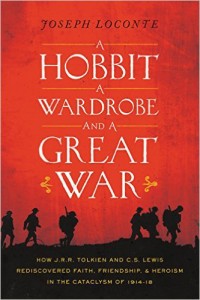Today, TGC carries my review of Joseph Loconte’s wonderful new book about how the religious/political cataclysm of the Great War and its aftermath shaped the fiction of J.R.R. Tolkien and C.S. Lewis:
Recently I finished reading my daughter The Lion, the Witch and the Wardrobe. It was her first time hearing the story; it was my first time reading it since I read Joseph Loconte’s delightful yet sobering A Hobbit, a Wardrobe, and a Great War...The highest compliment I can think of to give this book is that Loconte…has revealed to me new depths in Narnia, as well as in Middle-Earth and the Space Trilogy.
I’d been aware—who could miss it?—that all three were written in reaction against the de-Christianization of Western culture. The most delightful moment of Loconte’s book for me was this vignette: Lewis wrote the first book of the Space Trilogy in 1938 to confront readers with the biblical doctrine of the fall, and was dumbfounded when he discovered that no one who read the book saw the biblical connection. Rather than give up in despair, he concluded the public was now so theologically ignorant that, as he wrote to a friend, “Any amount of theology can now be smuggled into people’s minds under cover of romance.” The rest is history.
As I write at TGC, while the book is insightful on Tolkien and Lewis, I think its greatest service is to help recover some historical memory of the religious and political significance of the Great War – over the past few years I have become more and more convinced that the early 20th century was the great pivot that created our present historical situation. As always, your comments are welcome!
